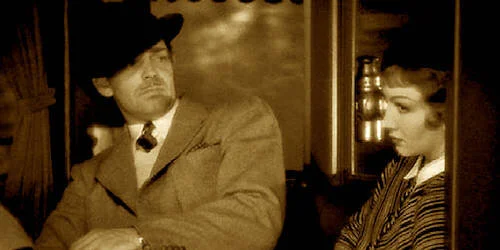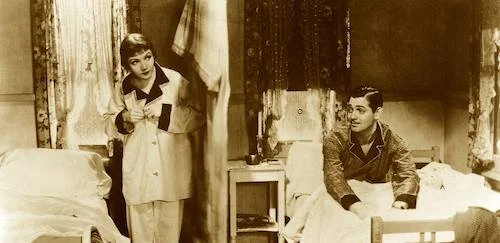It Happened One Night
This review is a part of the Best Picture Project: a review of every single Academy Award winner for the Best Picture category. It Happened One Night is the seventh Best Picture winner at the 1934 Academy Awards.
It happened one night. The start of Frank Capra's golden years. The first (of only three) films to win the top five Oscar wins (Best Picture, Director, Actor, Actress, and Screenplay). The cementing of Clark Gable and Claudette Colbert's superstardom. The biggest push of modern day romantic comedies. It happened one night.
From an initially lukewarm response, It Happened One Night suddenly burst into the sleeper hit of the year. Colbert declared it the worst film she ever acted in while shooting was going on, and yet the film took the world by storm. Looking back on the movie, it's hard to even see why there was even a back-and-forth reaction. There's nothing particularly polarizing about the film, even for the '30s. This is pre-code Hollywood we're talking about. Babyface just came out the year before this film. It Happened One Night wasn't particularly risqué in most senses.
Yet, despite its confused first impressions, it went on to win Best Picture in the first ceremony that the Academy Awards was stationed around one calendar year: just 1934. It was the figurehead film of that ceremony, and it made its mark winning the top five awards. It went from a typical film, to being the definitive film of that year (and possibly still is to this day).
Clark Gable and Claudette Colbert are particularly great at showcasing resentment towards one another for a portion of the film.
Maybe being on set made this film seem like a waste of time. After all, much of the narrative is Colbert and Gable on the road, getting wrapped up in various hijinks (not to mention that hay scene), so not seeing the finished product during shooting may have rendered Colbert's perspective. Once you view the entire film, everything falls into place. I also love a good screwball comedy, but Night is a cleaner take on the genre. Shenanigans only occasionally get top priority. Romance is also important, and writer Robert Riskin uses the time between the two lead characters to churn a painful partnership into love.
Maybe that's where our rom com formula was perfected. Night features a desperate journalist that finds the best story of his career in the form of finding and returning an escaped heiress that is trying to reunite with her loved one (of whom her aristocratic, renown father disapproves of). Much of the trip is the butting-of-heads between these two stubborn bulls with their own agendas. It's almost as if they bond over their ability to bother each other. Sounds like a marriage waiting to happen to me.
Eventually, both leads agree to disagree, in order to survive one another.
Night succeeds because it always has its plot in the back of its mind. The complexities of these two rebels traveling about only get stronger as the film progresses. Feelings get tangled, but they get entwined in the actual plot threads as well. It's a great touch that complicates the entire film, which is always a great asset for a situational comedy to have. More feelings means more players get involved: now the husband-in-waiting is no longer a goal, but a pawn in this sloppy chess game.
By the end, these two rivals become in sync with one another, as they adopt each others mannerisms.
The biggest kick Night delivers is how two lovers bond over the idiosyncrasies of life: how to hail a car, survival tips, and an obsession with the walls of Jericho. When other voices get involved (perhaps misled fathers) that cloud the perception of a loved one, Night truly shines. Love isn't only about logic. It's also the silly things that two people somehow can agree upon.
It Happened One Night is a Frank Capra film that feels a little bit left field of his usual working class, greater picture works (It’s a Wonderful Life, Mr. Smith Goes to Washington, and a later Best Picture winner You Can’t Take it With You). It's a bit more focused on the finer details, and maybe that's why it took so long for audiences to wake up. Once they saw all of the great inner workings of a comedy that had no business being this intricate, the walls of Jericho came toppling down.
Andreas Babiolakis has a Masters degree in Film and Photography Preservation and Collections management from Ryerson University, as well as a Bachelors degree in Cinema Studies from York University. His favourite times of year are the Criterion Collection flash sales and the annual Toronto International Film Festival.








